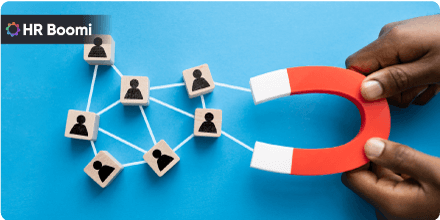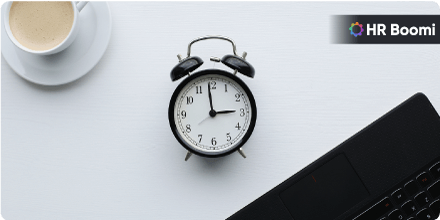
Table of Contents
Inside the ever-evolving panorama of human assets, the mixing of synthetic intelligence has been verified to be a transformative pressure, streamlining methods and improving choice-making. In this era of virtual transformation, corporations are harnessing the power of AI to revolutionize HR automation. This text will explore 4 real-lifestyle memories that vividly illustrate how AI reshapes the HR panorama.
From enhancing recruitment efficiency to improving worker engagement, those case studies exhibit the tangible benefits of incorporating AI in human resources. Consistent with a report by Deloitte, 53% of businesses have already begun using AI in their HR functions. Let’s delve into those amazing examples to recognize better how AI is making a good-sized impact in global HR automation.
In this blog, we can explore 4 notable real-life examples of ways AI is revolutionizing HR automation. Each story highlights a selected region of HR in which AI is creating a significant impact. From growing the performance of recruitment tactics to improving worker engagement, case research underscores the tangible blessings of AI in human assets. So, barring additional ado, let’s embark on our journey to apprehend how AI is reshaping HR practices.
Recruitment Reimagined
Streamlining the Hiring Process
Recruiting pinnacle intelligence has always been a crucial feature within HR. But the traditional recruitment method, with its mountains of resumes and time-eating interviews, regularly brought about inefficiencies and potential biases. AI has reimagined this method. Take the example of Unilever, a multinational purchaser items organization that applied a modern-day AI device in its recruitment.
This AI leverages natural language processing (NLP) and machine learning to parse resumes and become aware of the most suitable applicants. Unlike conventional keyword-matching algorithms, Unilever’s AI comprehends context and understands the nuance of competencies and experiences. As a result, the enterprise controlled to reduce its recruitment procedure from a mind-blowing four months to a mere four weeks, a feat that could be unattainable except for AI.
Furthermore, the hiring method has become more information-driven and goal-oriented, which caused a super sixteen% boom in the range in their body of workers. This tale illustrates how AI revolutionizes HR automation by making recruitment quicker, extra green, and fairer.
Eliminating Bias in Hiring
One of the persistent demanding situations in recruitment is bias. Whether consciously or unconsciously, human recruiters can introduce bias into their choices, impacting variety and equity. AI recruitment tools are designed to be unbiased. A study by way of LinkedIn found that sixty percent of Genius experts trust AI to reduce bias within the hiring procedure.
Focusing on abilities and qualifications and reveling in these tools can help me choose the fine applicants based on merit. This no longer only guarantees an extra numerous staff but also makes hiring extra equitable. For companies, removing bias isn’t only a moral imperative but an enterprise necessity in an increasingly numerous and globalized world. AI recruitment equipment assists companies in attaining this aim, thereby reshaping HR practices.
The Broader Impact of AI on HR
The impact of AI on recruitment extends past simply performance and bias reduction. It also offers valuable insights into candidate behavior and choices. AI can provide guidance on optimizing process descriptions and candidate outreach by studying how applicants interact with task postings and the recruitment technique. Furthermore, AI can predict candidate fulfillment by reading ancient data and figuring out patterns among high-appearing employees.
This predictive component of AI is revolutionizing brain acquisition, allowing HR professionals to make more informed choices about who to rent. In this method, AI is transforming the way HR operates, shifting it from a reactive mode to a proactive one, ensuring that corporations rent the right Genius and offer an honest and green recruitment system.
Personalized Employee Development
Tailored Learning for Employee Growth
Worker development is a cornerstone of HR, and AI is a quintessential function in personalizing this procedure. Businesses like IBM are at the forefront of using AI to offer tailored learning studies to their personnel. In preference to relying on one-length-fits-all schooling packages, IBM’s AI machine analyzes every worker’s abilities, strengths, and weaknesses.
It then leverages this information to endorse personalized mastering possibilities. This approach acknowledges that not all personnel have identical development wishes and allows for extra green use of assets. As a result, employees receive the education immediately applicable to their career growth, leading to improved job delight and productivity.
Data-Driven Professional Growth
In a rapidly evolving job market, abilities quickly become obsolete, and employees must constantly upskill and adapt. AI is instrumental in identifying those evolving competencies and supporting employees to live competitively. IBM’s device no longer solely recommends gaining knowledge of opportunities; however, it additionally continues the music of worker development, adjusting pointers as abilities are received.
This information-pushed technique empowers both personnel and HR specialists. Personnel can manipulate their expert growth, deciding on the capabilities they want to develop. At the same time, HR can measure the effect of these getting-to-know tasks on the company’s typical performance. This stage of granularity in employee development is a testament to how AI is transforming HR by permitting a greater agile and statistics-pushed approach to study.
A Win-Win for Employees and Employers
The customized approach to worker improvement pushed through AI has multiple blessings. Employees appreciate the tailored guide and studying opportunities, leading to a 15% increase in pride at IBM. They experience more investment in their profession, fostering loyalty to the organization.
Employers, however, witness a 10% raise in productivity as employees acquire the skills critical to excel in their roles. In this win-win state of affairs, AI assists HR departments in retaining and nurturing their talent while enhancing normal organizational performance. It’s a shining example of how technology can empower personnel and employers to acquire their dreams.
Enhancing Employee Well-Being
A Proactive Approach to Employee Well-Being
Worker well-being has taken a center degree in HR practices, with a growing recognition of its impact on productivity and retention. Cisco, a worldwide technology corporation, has harnessed AI to enhance well-being through imposing AI chatbots. These chatbots often interact with personnel, inquiring about their standard of well-being, work-associated pressure, and activity satisfaction.
The chatbots can perceive developments and troubles within the corporation by amassing these records and applying sentiment analysis. This proactive method for employee well-being allows HR to cope with issues and implement measures to improve the overall work surroundings.
Data-Driven Insights and Trend Analysis
Using AI chatbots for employee nicely-being checks provides HR with precious data. As opposed to counting on periodic surveys or anecdotal comments, HR now has the right of entry to non-stop, actual-time insights into worker sentiments. Gartner’s survey findings indicate that 80% of companies will use AI-powered tools to reveal worker well-being by 2025. With AI, HR specialists can respond to on-the-spot worries and become aware of long-term tendencies. For instance, if the sentiment analysis constantly shows that personnel are confused about a particular difficulty, HR can take proactive steps to deal with it, thereby enhancing normal well-being.
Tangible Benefits of AI-Enhanced Well-Being
Implementing AI chatbots for worker well-being has caused concrete enhancements at Cisco. They reported a 20% discount in employee burnout, indicating that early intervention and guidance can save you prolonged strain and fatigue. Moreover, a fifteen increase in typical process pride highlights the high-quality impact of addressing worker worries in actual time. In this context, AI isn’t always just a tool for HR but an actual accomplice in growing a more fit, extra supportive painting environment. As worker well-being continues to gain importance inside the corporate international, AI is proving to be an invaluable asset for HR experts in this critical place in their paintings.
Predictive Turnover Analysis
Addressing the Costly Challenge of Employee Turnover
Worker turnover may be a sizeable venture for companies. When treasured employees leave, it no longer only disrupts the workflow but also ends in sizeable recruitment and onboarding fees. Predicting turnover before it happens is crucial for HR specialists to take proactive measures and preserve top talent.
This is where AI plays a pivotal role. Well-known Electric Powered (GE), a multinational conglomerate, has used AI algorithms to investigate factors influencing employee turnover. By considering employee performance records, satisfaction surveys, and outside exertions market information, the AI machine identifies patterns and predicts which employees are most likely to depart the enterprise.
How AI Predicts Turnover
AI-pushed predictive turnover evaluation is based on historical statistics and patterns. The algorithms analyze the traits and behaviors of personnel who’ve formerly left the enterprise. They look for commonalities in phrases of activity delight, performance, tenure, and external marketplace possibilities. Using spotting these styles, the AI gadget can assign a likelihood score to each employee, indicating the opportunity of them leaving. This method is particularly records-pushed and offers HR actionable insights.
Tangible Benefits and Cost Savings
Implementing predictive turnover analysis using AI has yielded considerable benefits for fashionable electric-powered. HR can take focused retention strategies by figuring out personnel in excessive danger of leaving. This will include presenting expert development opportunities, adjusting repayment, or addressing precise worries raised in satisfaction surveys. The result has been a 10% reduction in employee turnover rates, translating to sizable value savings. In addition to saving hundreds of thousands in recruitment and onboarding costs, GE has created a more solid and efficient group of workers.
This actual-lifestyles example from popular electric powered underscores how AI is revolutionizing HR automation by imparting a proactive and facts-driven technique to consider one of HR’s most difficult problems, worker turnover. It showcases how AI may be a treasured tool for HR specialists in preserving top talent and coping with organizational stability.
Conclusion
Incorporating artificial talent in HR automation is more than a fashion; it is an imperative shift in how HR departments function. These four real-life tales from Unilever, IBM, Cisco, and popular electric companies show AI’s profound impact on recruitment, employee development, well-being, and turnover analysis. The facts and insights mentioned on this weblog paint a clean image of the advantages corporations can obtain by embracing AI in their HR functions.
As we move ahead in this digital transformation era, it’s crucial for HR experts to no longer solely be aware of those advancements but also consider how they can leverage AI to decorate their practices. The combination of AI in HR isn’t approximately replacing human specialists; it equates them with the gear and insights needed to make better, extra-informed selections and create more efficient and cozy personnel in the long run.
So, as you navigate the ever-evolving landscape of HR, remember that AI isn’t just a technology; it’s an associate in reshaping the future of human sources. Include it, and watch your HR department thrive in this age of automation and statistics-pushed decision-making.
Recent Posts
-

In-house vs. Outsourced Payroll: Pros and Cons
-

Mastering Talent Retention: A Corporate Challenge
-

What is employer branding and how to apply it in your company?
-

The Significance of Employee Communication Within
-

What is time management and why is it important?
-

Net salary: what is it and how is it calculated?
-

Enhancing Employee Experience: Strategies for Excellence
-

10 Best Gifts to Boost Sales Channels
